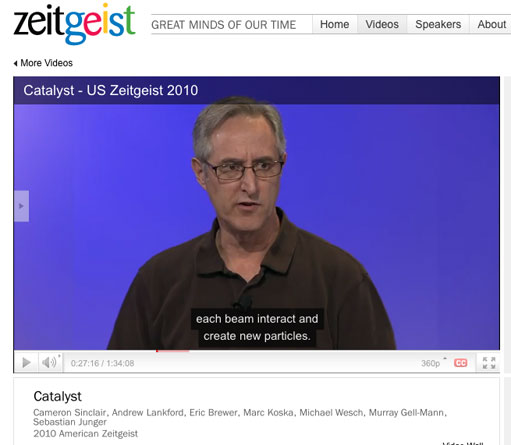
ATLAS e-News
23 February 2011
ATLAS at Google Zeitgeist
4 October 2010

The LHC has hit the headlines over the last few years, and to say that public interest has been piqued is an understatement. No-one knows this better than search engine giant and Internet superpower, Google, and so it is fitting that ATLAS Deputy Spokesperson Andy Lankford was invited along to the Google Zeitgeist conference last month to talk to the company's hand-picked audience of 'the leading thinkers of our time' about “the cool things that we do”.
Stemming from the German Zeit (time) and Geist (spirit), Zeitgeist refers to the general intellectual, moral and cultural climate of an era. This year's Zeitgeist Americas conference, the fifth since its inception, brought together 400 people who Google call their 'best friends' – 'from business leaders to statespeople, renowned writers and bloggers, professors and publishers, inventors and humanitarians, activists and musicians'. The theme of the gathering was 'Mindshift' – the power of ideas to alter how we think and live.
The private event is traditionally shrouded in mystery ahead of time, with the attendee list sworn to secrecy outside of itself and the online agenda password-protected. “They want people to talk in a candid fashion. They say everything is off the record,” explains Andy. “The main idea is to create a stimulating environment for the people who attend.”
And if a stimulating environment looks something like a giant two-day kids party for adults, then they did a fantastic job. From the location at a 5-star resort in Arizona, to the lecture hall custom-built within a ballroom, via demonstrations of robots and mind-reading devices, live music during coffee breaks, and a Cirque de Soleil performance between dinner courses, attendees were wowed and inspired at every turn. Maximum comfort ergonomic chairs allowed people to relax and focus on the talks; the proximity of the chairs to one another encouraged discussion and dialogue.
“It was very impressive to me because it was so different [to a physics conference],” says Andy. “Not like going into a giant auditorium. Nobody could go and sit in the back.”
Andy spoke on behalf of CERN about the LHC in a session about catalysts – people, ideas, and organisations that drive change. “I tried to speak a little bit to how taking on these challenging scientific problems is a catalyst to innovation,” he explains, “both in terms of technology and ways of collaborating.”
Other speakers in the Catalyst session included quark-postulator and Nobel Laureate Murray Gell-Mann, and Marc Koska, inventor of a single use syringe which took 17 years to secure a manufacturer but is now credited with having saved over nine million lives worldwide.
“They had a truly interesting and inspiring set of speakers,” Andy smiles, recalling the owner of a Venezuelan rum company who managed to enlist thieving gang members as his new workforce and save them being killed by the police.
In between sessions, Andy answered a lot of questions from people curious about CERN or ATLAS, but he also took the opportunity to discuss cloud computing and crowdsourcing with friendly “young Internet entrepreneurs”.
“I think it's finally beginning to sink in for me what 'information technology' means, as a processing oriented person,” he reflects. “You see how much innovation has grown on the Internet, and it's all about information. Sorting it. Accessing it. It's not so much about processing.”
 Ceri PerkinsATLAS e-News
|